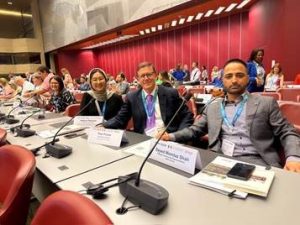Call for more refugee settlement pathways
 NGO delegates from 26 countries today have called for international action to expand resettlement and additional migration pathways for refugees at a major refugee settlement conference in Geneva.
NGO delegates from 26 countries today have called for international action to expand resettlement and additional migration pathways for refugees at a major refugee settlement conference in Geneva.
The call came as the UN’s refugee agency UNHCR released a new report detailing that 2.9 million of the world’s refugees will be in priority need of resettlement in 2025.
The three-day annual Consultations on Resettlement and Complementary Pathways (CRCP) in Geneva saw the release of UNHCR’s assessment of global refugee resettlement needs for 2025.
The 2024 CRCP has brought together 340 delegates from 44 countries, including representatives from government agencies, NGOs, refugee-led organisations, UN and inter-governmental bodies, private sector organisations and academic institutions.
UNHCR’s Projected Global Resettlement Needs 2025 report identifies 2.9 million refugees who need resettlement next year, half a million more refugees than were identified by UNHCR as needing resettlement a year ago.
The number of refugees needing priority resettlement in 2025 is 30 times greater than the 96,311 refugees who were resettled in 2023 after being referred to states by UNHCR.
A joint NGO statement backed the call by UN High Commissioner for Refugees, Filippo Grandi, for states to step up and provide sustainable and multi-year commitments to refugee resettlement.
Welcoming the expansion of resettlement programs by some states, the NGO statement expressed concern about the number of states reducing or pausing their resettlement programs despite the pressing global need.
It called on states to maintain and expand resettlement and complementary pathways programs, the NGO statement noted resettlement’s vital role in providing a lifeline for refugees at greatest risk in hosting countries, particularly LGBTQI+ refugees in countries where same-sex intimacy is criminalised, women and girls experiencing sexual and gender-based violence, people with disabilities and complex health needs, and other refugees facing imminent danger.
The CRCP is discussing progress on the Third Country Solutions 2030 Roadmap, a 12-year strategy to resettle one million refugees and support the migration of two million refugees through complementary pathways.
AMES Australia Manager International and Community Development, and former refugee, Melika Sheikh Eldin, who is attending the consultation, said there were useful discussions about complementary pathways focusing on refugees’ access to skilled labour migration, education pathways, community sponsorship and family reunion.
“Dialogue on resettlement included the perspectives of refugee hosting states, exploration of the role of refugee-led organisations, strategies to support states with new or developing resettlement programs, responses to climate change, and resettlement’s role in enhancing the protection of LGBTQI+ refugees and providing alternatives to risky journeys to safety,” she said.
“The importance of post-arrival support of newly resettled refugees was also explored in sessions on orientation prior to and after arrival, support for survivors of torture and trauma, housing solutions, digital inclusion, private sector partnerships and creating welcoming communities,” she said.
The statement made five recommendations, inline with those proposed by the UNHCR.
They are: expanding resettlement and maintaining a protection-centred focus; adopting innovations and ensuring equity in responses; investing in and building linkages between host and third countries; leveraging expertise through cultivating trust-based partnerships, and; removing barriers to family reunification and other migration pathways.
“Five years ago, this forum agreed on a 10-year vision of third country solutions for one million refugees through resettlement and two million refugees through other migration pathways. After the COVID pandemic, this goal was extended by two years to 2030. We know that much needs to be done to come close to achieving this collective goal and there are many obstacles, both political and practical,” the statement said in conclusion.
“However, we are encouraged by the impressive work being done by many to expand refugees’ access to complementary pathways and by the tenacity of advocates who continue to press a positive case for expanding access to resettlement. As NGOs working across the world to respond to the impacts of forced displacement, we remain committed to working with states, international organisations, refugee communities and other actors to continue to push for more durable solutions for people forcibly displaced. We look forward to the next three days of sharing information and ideas, strengthening international partnerships, and inspiring each other to remain committed to this vital and life-changing work,” it said.
Read the full statement here: Consultations on Resettlement and Complementary Pathways (CRCP) 2024 (refugeecouncil.org.au)












